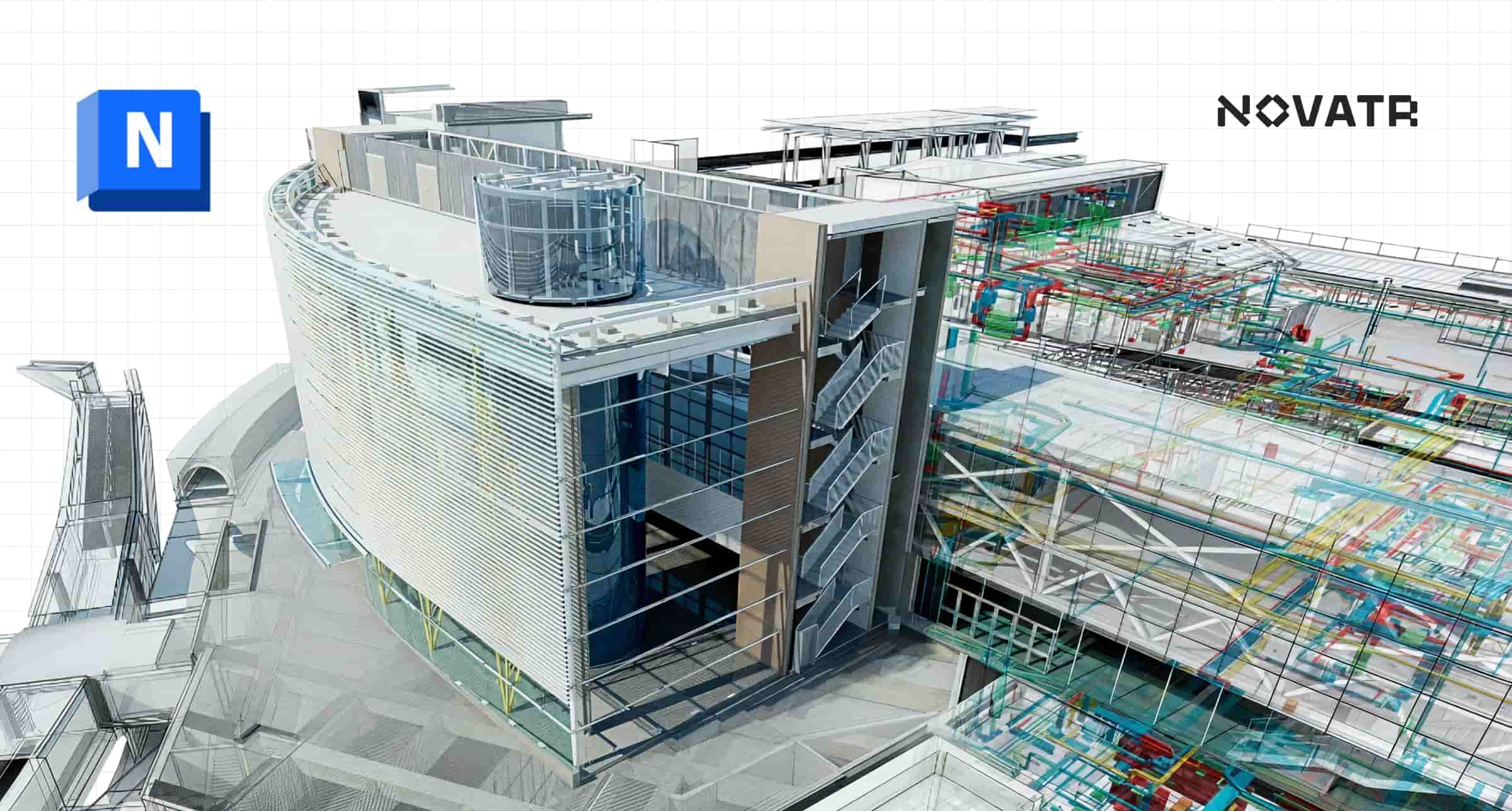.jpg)
India is witnessing a remarkable digital shift in the construction industry, with BIM adoption gaining strong momentum. India is experiencing a significant surge in Building Information Modeling (BIM) adoption, driven by both government initiatives and private sector enthusiasm like the Smart Cities Mission. According to the Research Gate, approximately 70% of construction professionals in India have either adopted BIM or are in the process of doing so.
For graduates in architecture and engineering, this is the perfect time to enter the field. Learning BIM for civil engineers opens up opportunities to work on high-impact projects, from transportation systems to smart buildings. With the government promoting digital construction methods, BIM expertise is becoming a top requirement across firms.
By mastering BIM tools and workflows, young professionals can future-proof their careers and lead the change in India’s growing AEC sector. All it takes is the right skills, and the journey begins now.
Why is BIM the Future of Architect & Engineering?
As architecture and engineering evolve with technology, Building Information Modelling is emerging as a game-changer. Here is why it is shaping the future of design and construction.
1. Digital evolution in AEC
The Architecture, Engineering, and Construction industry is rapidly embracing digital tools. BIM sits at the heart of this transformation, making project data more accessible, accurate, and actionable.
2. Increased job demand
As the AEC industry modernises, the demand for BIM-trained professionals is rising sharply. Learning BIM today opens doors to international opportunities and top-tier architecture roles.
3. Smarter collaboration
BIM allows architects, engineers, and stakeholders to work together on a single model in real time. It eliminates silos, reducing errors and saving time across project phases.
4. Growing global adoption
Countries like the UK, USA, and India are pushing for BIM mandates in public infrastructure. With this shift, the need for professionals skilled in BIM and architecture is growing across government and private sectors.
5. Sustainable design made it easier
BIM supports energy analysis and resource planning from the very first stages. Green building projects benefit from improved forecasting, reducing environmental impact and long-term operational costs.

Who Should Consider a Career in BIM?
If you are an architect, civil engineer, or MEP professional looking to stay relevant in a rapidly changing industry, BIM could be your next big step. With projects becoming more complex and timelines tighter, the ability to work with data-rich 3D models is now a must-have. That is why BIM in architecture is gaining strong traction, transforming how buildings are planned, designed, and executed.
Even fresh graduates in architecture or engineering can benefit from learning BIM early on. It gives them a competitive edge and helps them enter the workforce with practical, job-ready skills. For those aiming to future-proof their careers, adopting BIM for architects means embracing collaboration, sustainability, and smart decision-making from day one. It is a smart investment in a career that is only going to grow.
Key Skills Needed to Become a BIM Professional
Architectural BIM is about more than just mastering software, it is about navigating the collaborative, problem-solving environment of modern design. Here are five key skills you will need to succeed in the AEC industry.
1. Software Proficiency
Mastering BIM tools like Autodesk Revit, BIM 360, and ArchiCAD is essential. These platforms enable you to create accurate 3D models and manage the flow of information. BIM for architects and BIM for civil engineers requires expertise in software to ensure the accuracy and efficiency of design and construction processes.
2. Collaboration and Communication
BIM is not just about working with software, it is about working with people. Successful BIM professionals must be able to communicate clearly across multidisciplinary teams, ensuring that all stakeholders (architects, engineers, contractors) are aligned and share updated models and data.
3. Knowledge of Construction Processes
Understanding the lifecycle of a project from conceptual design to construction and maintenance is important. BIM professionals need a solid foundation in construction processes to ensure their models support real-world building needs. This knowledge bridges the gap between design and on-site execution.
4. Problem-Solving
As projects evolve, new challenges arise. BIM professionals must have strong problem-solving skills to address issues like clashes in design or errors in models. The ability to troubleshoot and find solutions on the fly is crucial for meeting deadlines and maintaining the project's integrity.
5. Attention to Detail
The smallest errors in a model can lead to costly mistakes. BIM professionals need a keen eye for detail to ensure the accuracy of every aspect of the model, from measurements to material specifications. This skill is particularly vital in architectural BIM to maintain design integrity and construction precision.
Key BIM Software You Need to Learn
Here are the key BIM software that you must learn.
1. Autodesk Revit
Revit is one of the most widely used BIM tools for architects, structural engineers, and MEP professionals. It allows you to create intelligent 3D models that carry data for every element, making design changes quick and coordinated across all views and drawings. Learn Autodesk Revit in 2026!
2. Navisworks
Used mainly for project review and coordination, Navisworks helps teams detect clashes and resolve issues early in the design stage. It supports collaboration across different disciplines by combining models and data into a single interface for analysis. Learn Navisworks in 2026!
3. AutoCAD
Although not a pure BIM tool, AutoCAD is still widely used in construction and design. It’s often used alongside BIM tools for 2D drafting, detailing, and converting older CAD files into BIM-compatible formats.
4. Dynamo
Dynamo is a visual programming tool that works with Revit to automate tasks and create complex designs using logic-based scripts. It is especially useful for parametric modelling and boosting productivity on repetitive tasks.
5. BIM 360
BIM 360 is a cloud-based platform that enables real-time collaboration on construction projects. It allows teams to manage design, documentation, and on-site workflows from a single place, reducing delays and improving accuracy across the board.
Best BIM Courses To Become a BIM Professional in India
Explore the top five BIM courses for architects to become a BIM professional in India.
|
Course Name |
Duration |
Fees |
Placement Assistance |
|
7 months |
INR 1,95,000 |
Yes |
|
|
7 months |
INR 1,95,000 |
Yes |
|
|
7 months |
INR 1,95,000 |
Yes |
|
|
BIM Ready Complete Course BY Techno Struct Academy |
6 months |
N/A |
Yes |
|
BIM Course in Delhi by Capricot |
N/A |
N/A |
No |

How to Choose the Right BIM Course?
Choosing the right BIM course can shape your future in the AEC industry and bring various BIM career opportunities. With many programmes available, it is important to find one that fits your goals and builds strong expertise in BIM for architects and engineers. Here’s what you should look for:
- Check the Course Curriculum: Make sure the syllabus covers both basic and advanced BIM concepts, including tools like Revit, Navisworks, and project coordination workflows relevant to BIM for architects and engineers.
- Look for Industry-Relevant Tools: A good BIM course should offer hands-on training in widely used software to prepare you for real-world scenarios in design and construction.
- Consider Accreditation and Certification: Ensure the course is recognised by industry bodies or employers. A certified programme can strengthen your resume and help you stand out in competitive roles.
- Evaluate Instructor Experience: Learn from professionals who’ve worked in architectural BIM or civil engineering projects. Their experience can offer valuable practical insights beyond theory.
Novatr’s BIM Course: Why does it Stand Out?
Novatr is the best ed-tech platform reshaping how professionals upskill in the AEC industry. Designed to meet real-world demands, Novatr’s courses go beyond theory by blending expert guidance with project-based learning. Their best BIM course for civil engineers and architects is tailored to build practical knowledge, software fluency, and a clear understanding of interdisciplinary workflows.
Here is why Novatr’s BIM course stands out:
- A focused 1:20 mentor-student ratio ensures individual attention throughout the learning journey.
- Gain hands-on experience with Revit and 12+ industry-relevant tools used in top global firms.
- With 80+ hours of structured sessions, learners interact with mentors and peers in real time.
- Learn directly from BIM specialists and professionals working across international markets.
- The curriculum is designed to build not just skills but a strong portfolio for better job opportunities.
Job Opportunities & Salary Expectations for BIM Professionals

For those considering a career after M. Arch, BIM offers dynamic job roles that combine creativity, technology, and real-time coordination. The growing demand for BIM professionals opens doors across architectural firms, engineering consultancies, and architecture companies.
1. BIM Coordinator
Salary: INR 8,00,000 per year
Ensuring seamless collaboration among multiple disciplines, this role focuses on integrating models, detecting clashes, and maintaining consistency across architectural and engineering drawings. The demand for BIM Coordinators is growing as more firms adopt integrated workflows.
2. BIM Modeler
Salary: INR 8,50,000 per year
Tasked with translating design plans into detailed 3D models, BIM Modelers work closely with architects and engineers to deliver accurate visual representations. Their work forms the foundation for coordination, planning, and on-site execution.
3. BIM Engineer
Salary: INR 4,50,000 per year
Bridging engineering design with advanced modelling, these professionals ensure that every technical detail - structural, electrical, or mechanical, is embedded into the digital model. They are increasingly sought-after in complex infrastructure and real estate projects.
4. BIM Specialist
Salary: INR 7,50,000 per year
Known for their in-depth knowledge of software and data-driven insights, BIM Specialists focus on specific areas like energy analysis, construction simulation, or visualisation. Their niche expertise significantly boosts efficiency and precision in design execution.
Conclusion
Stepping into the world of BIM career opens up a future-proof path for those with a background in architecture or engineering. If you are wondering where to begin, Novatr offers one of the most comprehensive BIM Courses for Architects and Civil Engineers in India to help you build real-world skills. Their immersive curriculum, expert mentors, and hands-on approach make it the ideal BIM course in India for serious learners looking to stay ahead in the industry.
Now’s the time to take control of your career journey. For more insights, checkout Novatr’s Resource Page!
Was this content helpful to you








.png)

